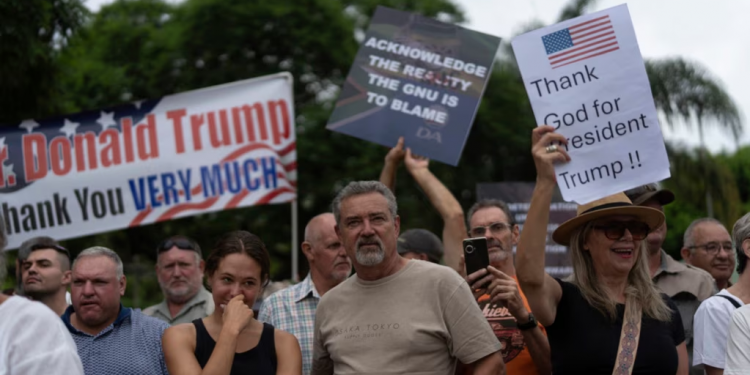A group of white South Africans gathered outside the U.S. Embassy in Pretoria on Saturday, voicing support for U.S. President, Donald Trump and claiming they are victims of racism under their own government.
Hundreds of demonstrators, primarily from the Afrikaner community, held placards reading “Thank God for President Trump” and condemned what they view as discriminatory policies implemented by South Africa’s Black-led government. Their protest followed Trump’s recent executive order, which cut aid to South Africa over claims that Afrikaners are being unfairly targeted under a new land expropriation law.
Trump’s order described South Africa’s Afrikaners, descendants of Dutch settlers, as “racially disfavored landowners” and alleged that their property was being seized. However, the South African government has denied these claims, emphasizing that no land has been taken under the new legislation.
South African President, Cyril Ramaphosa, addressing Parliament this week, dismissed Trump’s assertions as misinformation, stating that the law does not authorize arbitrary land seizures but aims to correct historical injustices.

“The people of this country know the pain of forced removals,” Ramaphosa said, referencing the mass dispossession of Black South Africans under colonial rule and apartheid. He stressed that the land reform law is intended to promote equitable redistribution for public benefit.
In addition to withdrawing U.S. aid, Trump announced plans to offer refugee status to Afrikaners, a move that has further escalated tensions between Washington and Pretoria. While Afrikaners make up just a fraction of South Africa’s white minority, the debate over land reform has sparked broader grievances among white citizens regarding policies such as Black Economic Empowerment (BEE), which promotes economic opportunities for the Black majority.
At the protest, demonstrators held signs not only against land expropriation but also against affirmative action policies introduced since the end of apartheid in 1994. Some white South Africans argue that these measures, designed to address historical inequality, have unfairly disadvantaged them.
Elon Musk, the billionaire entrepreneur and a South African native, has also criticized the government, claiming it enforces anti-white policies. Musk’s Starlink satellite internet service was recently denied a license in South Africa for failing to comply with affirmative action regulations, fueling further debate.
Despite racial tensions, South Africa has largely maintained social cohesion since the fall of apartheid. The current government is a coalition of 10 political parties working together to govern the country, including both Black- and white-led groups.
As the land reform debate continues to unfold, the divide over race and economic policy remains a sensitive and complex issue in South Africa’s post-apartheid democracy.









